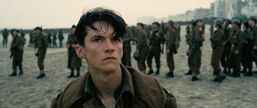The subject of Dunkirk, I just think about it, I don't think it's good to shoot.
The real historical events, the time and place, the process and the ending are all known. It is not a bloody battle, but an escape from nowhere. Fundamentally, "Dunkirk" has lost the natural advantage of the "no proposition" of the previous Nolan movies. However, the limitation and confinement of this objective condition may be exactly what makes Nolan's filming fun.
The film's three-line narrative of sea, land and air is still amazing. One hour a day a week, the three time spans are constantly interspersed, gradually uncovering their connections, and finally converging into one point. Nolan once again practiced what he called "enhancing the dramatic effect and the connotation of the story by manipulating time", and the rhythm was advancing step by step, creating a strong sense of oppression. It is the use of this narrative method that makes this film unique, and it is difficult to find its approximate reference in previous war films.
However, this narrative also reveals the regret that the design is too strong. Especially in the line of Xiaobing, who took the route of "escape life - take a sharp turn - fall into the water" again and again, people couldn't help but secretly sigh "this child is really unlucky". For another example, Cillian Murphy's character setting obviously has a sense of design with various ecological elements on the battlefield, which is a bit deliberate.
Compared to the narrative technique, the experimental nature of the film's soundtrack obviously goes further. The dialogue in the whole film is sparse, but the music has a strong sense of presence, which has become an important promoter of rhythm and emotion production. Such a rich musical combination has led to mixed reviews, and I personally feel that although Hans Zimmer's score is more effective in stimulating the pressing rhythm, it is more worthy of appreciation for the effort in soothing emotions.
From the point of view of a movie fan, the film "Dunkirk" has a strong language and a strong sense of immersion. It is undoubtedly a success to create the tension of history with time and music. From the point of view of ordinary audience viewing experience, this kind of tension is uncomfortable. In the past Nolan films, the interlacing of multiple lines often created a huge narrative pleasure; and the tension and despair created by "Dunkirk" ultimately formed the depression of the overall atmosphere of the film. Although there are also lyrical passages such as Tom Hardy flying backwards at the end, the emotions that I have been suppressed throughout the scene have not been completely released and vented from beginning to end. The lack of more touching touch and comfort is a regret of this film.
View more about Dunkirk reviews











